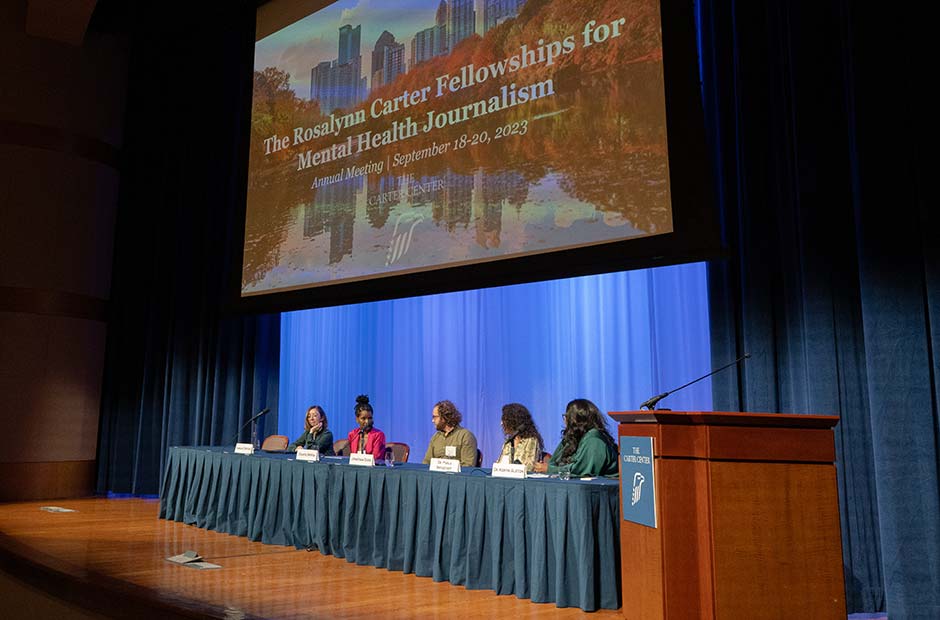The Carter Center provides training, resources, and support for fellows during a year of mental health reporting. Fellows choose their own topics and receive a stipend.
ATLANTA — The Carter Center is pleased to announce that applications are now being accepted for the Rosalynn Carter Fellowships for Mental Health Journalism. Selected fellows will join a top-notch cohort of more than 275 fellows awarded over the past 28 years. Qualified applicants must be journalists with at least three years of experience, U.S. citizens and reside within the U.S.
The year-long, nonresidential fellowships equip journalists with the resources necessary to produce compelling and solutions-based stories on mental health and substance use issues. The diverse cohort of journalists develop the necessary skills to effectively report on difficult but important topics across evolving and emerging platforms.
The application for the 2024-2025 Rosalynn Carter Fellowships for Mental Health Journalism is available here. Applications must be completed and submitted online. The deadline is 11:59 p.m. ET on Friday, April 12, 2024. Fellows will be announced on July 12th on the Center's website and social media channels. The 2024-2025 fellowship year begins in September 2024, when new and outgoing fellows join to discuss their proposed and completed projects. See other important dates and deadlines here.
“This fellowship program is a fantastic and far-reaching legacy for its founder, former U.S. First Lady Rosalynn Carter, who passed away in November 2023. We’ve heard from so many alumni that the fellowship changed their career and elevated mental health reporting for them, their media outlets, and even their country,” said Carter Center Mental Health Program Director Dr. Eve Byrd. “More than ever, we need to improve the quality and reach of mental health reporting which serves to provide hope and spotlight solutions to address the mental health crisis faced across all populations.”
Selected U.S. fellows are awarded a $10,000 stipend and receive intensive training on mental health reporting. They are assigned to a cohort and engage in networking opportunities with advisors and other fellows.
Fellows from across mediums pursue a range of innovative journalism projects that tackle some of society’s biggest behavioral health challenges and seek to drive change in their communities while reducing stigma through storytelling.
Fellows are selected by a committee of current and former journalists, mental health experts, and the Fellowship Advisory Board, with an emphasis on diversity across ethnicity, geography, mediums, and the communities their fellowship projects will cover.
Shedding light on underreported issues and driving change
Fellows undertake timely projects that have a significant impact on their communities regarding mental health and substance use issues. In the past, projects have contributed to changes in services and public policies. Previous projects have investigated problems with psychiatric housing in hospitals that eventually led to a state Supreme Court ruling; inspired policymakers in a major American city to allocate millions of dollars to address homelessness; and exposed the complex and devastating mental health and substance use challenges faced by veterans returning from Iraq and Afghanistan.
Fellowship projects have been nominated for the Pulitzer Prize. They also have earned Emmy Awards, a Peabody Award, the Edward R. Murrow Award, Signal Awards and awards from the Association of Health Care Journalists, Public Radio News Directors Inc., the American Psychiatric Association, Mental Health America, and the National Alliance for Mental Illness.
The Rosalynn Carter Fellowships for Mental Health Journalism are part of the Carter Center's Mental Health Program, which works around the world to improve access to mental health care and reduce stigma and discrimination against people with mental illnesses. The program is committed to providing journalists with the tools they need to report on mental health and substance use topics. A revised Journalism Resource Guide on Mental Health reporting is available so journalists can accurately cover stories that include mental health and substance use. Fellows’ reporting is curated on Instagram @rosalynncarterfellows and @CarterFellows on X, (formerly Twitter).
For more details on how to apply, read here and review our frequently asked questions. For additional inquiries not covered in the FAQs, please email carterfellows@cartercenter.org.
Contact: Rennie Sloan, rennie.sloan@cartercenter.org.
###
Please sign up below for important news about the work of The Carter Center and special event invitations.

2022-2023 fellows present their projects during the annual fellowship meeting at The Carter Center in September 2023.